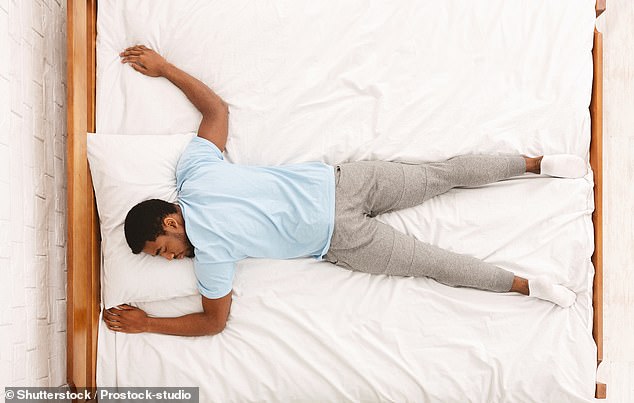It’s something we all look forward to after a stressful day at work.
But when you climb into bed and pull your duvet up around you, which position do you naturally gravitate towards?
According to a new survey, your answer could predict whether or not you’re financially successful.
A survey of over 5,000 Brits has revealed the most common sleeping positions among the top 10 per cent of earners.
The results show that almost a third (29 per cent) of high-earners sleep in a ‘freefall’ position.
In this position, people sleep on their stomach with their head to one side and their arms wrapped around the pillow.
While this is the most common sleep position among high earners, experts warn that it could leave you with severe neck pain.
Speaking to MailOnline, Lisa Artis, deputy CEO at The Sleep Charity, said: ‘It’s fine to sleep on your back or sides but we suggest avoiding sleeping on your tummy as it puts a lot of strain on your neck as it is permanently twisted throughout the night.’

It’s something that we all look forward to after a stressful day at work. But when you climb into bed and pull your duvet up around you, which position do you naturally gravitate towards? According to a new survey, your answer could predict whether or not you’re financially successful (stock image)
For the survey, which was commissioned by Bed Slats, researchers surveyed 5,438 Brits on their preferred sleep position, average sleep duration, weekday wake-up times, and earnings.
Overall, the fetal position was found to be most popular, with 29 per cent of respondents opting for this cosy stance.
This was followed by the pillow hugger position (24 per cent), the freefall position (14 per cent), the thinker position (13 per cent), and the soldier position (10 per cent).
Inbaal Honigman, a body language expert, said: ‘The most common sleep positions are both quite protective – the introverted fetal position, where people curl up to shield themselves, and the cuddly pillow hugger position where sleepers wrap themselves around their pillow (or partner) for comfort and security.’
However, the top sleeping positions were very different for the top 10 per cent of earners.
Freefall was most popular among this group (29 per cent), followed by soldier (23 per cent), fetal (21 per cent), pillow hugger (13 per cent), and the thinker (nine per cent).
The freefall position somewhat resembles the position you’d adopt while jumping out of a plane.
This could indicate the the top earners are natural risk-takers, according to Ms Honigman.
‘They leap first and ask questions later,’ she said.

From the ‘Foetus’ to the ‘Soldier’, most people sleep in one of six main positions – and some are much better for us than others
Beyond the sleeping positions, the study also found that top earners sleep an average of six hours and 58 minutes per night – 22 minutes less that lower earners.
On average, top earners wake up at 6:42am, compared to the lower earners’ 7:06am.
While the findings show that the top-earners prefer the freefall position, sleep experts generally agree that sleeping on your front is a no-go.
Speaking to MailOnline, Martin Seeley, a sleep expert at MattressNextDay, said: ‘Sleeping on your side is regarded as the best position.
‘It can help improve circulation and digestion, and also opens the airways for easier breathing which means less chance of snoring.’
Whatever your position preference, Ms Artis says that the correct support is ‘crucial’.
‘A good bed can make all the difference to your sleep,’ she told MailOnline.
‘Did you know that your head weighs 4.5-5.5 kilos (10-12lbs), and that your neck contains seven of the spine’s 33 vertebrae?

The Foetus gets its name from the position of a baby in the womb, and sees the sleeper curled up into a ball as they lie on one side
‘Neck pain, stiff necks and even persistent headaches could simply be the result of poor pillow support while in bed sleeping.
‘A good pillow should hold your head in the correct alignment – that is, in the same relation to your shoulders and spine as if you were standing upright with the correct posture.
‘One that is too soft will allow the head to flop, curving the neck.
‘One that is too hard will give you a crick in the neck.’
This article was originally published by a www.dailymail.co.uk . Read the Original article here. .


